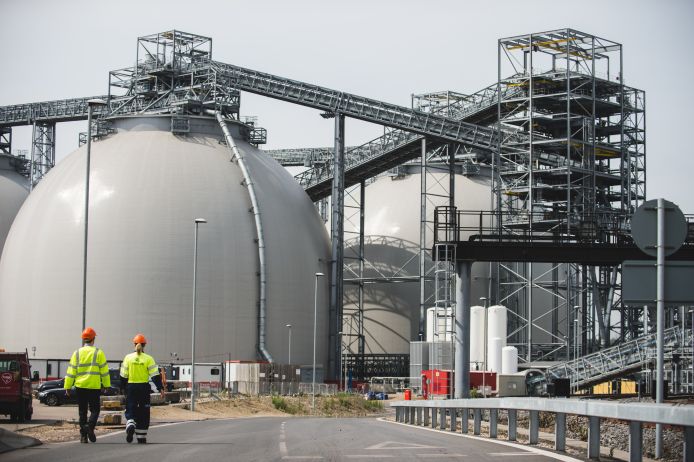What does Drax do?

Drax is the UK’s largest power station, based in Selby, North Yorkshire. On upgrading almost half of the plant to run on sustainable biomass – in the form of compressed world pellets – Drax became Europe’s largest decarbonisation project. For the first half of 2016, 70% of our output came from renewable sources and we are now a predominantly biomass-fuelled electricity generator. Drax typically provides about 8% of the UK’s electricity.
What are the key innovations of Drax?
The upgrades, to enable almost half of the power station to run on compressed wood pellets instead of coal, couldn’t have been done without innovative technology on a large scale.
There was no existing path or proven, substantial technology for us to follow to allow the upgrades to occur – this was what we had to create.
We developed a robust, international supply chain to safely transport the sustainable wood pellets from source to Drax. We overcame the challenge of storing large quantities of pellets on site (they vary in properties from coal so have to be treated very differently). Also, a unique transportation system to move the pellets around Drax was put in place, and during this time we continued to supply the UK with about 8% of its electricity.
Drax has achieved over 80% carbon savings in our upgrades to biomass compared to coal.
We provide reliable, flexible electricity from a sustainable source. Not only is it renewable and able to be flexed up and down, but as Imperial College and the economic consultancy NERA found, upgrading to biomass is one of the most sensible ways for the UK to get off coal at the fairest price to the bill payer.
How do you see the energy sector developing over the next 20 years?
Coal is to be off the grid by 2025, and that’s what the UK’s energy sector has to work towards. Renewables will have to become bigger players, and there is clear evidence of that already happening this year, with renewables outperforming coal at times.
At Drax we’ve been preparing for this for many years, which is why we’ve upgraded almost half the power station to run on a reliable, renewable source that can be flexed to meet the UK’s energy requirements.
I think in order for the UK to go fully renewable, we need a mix of technologies. Therefore it’s important that Drax, and what we’re doing with biomass, complements wind, solar and other technologies to provide reliable, renewable electricity, and that suitable ancillary services are in place to ensure a secure and dependable electricity supply for the UK.
How many engineers does Drax employ?
Of Drax Group's 1,400 employees, about 200 are engineers.
Do you think we do enough to promote engineering and science in the UK?
Engineering is a difficult career to study for – the work is hard (lots of maths) and it requires a lot of determination. I think the computer and technology side of engineering probably appeals more to young people looking to choose a career path than the traditional ‘hard slog’ engineering.
However, I believe opportunities and encouragement are certainly present through education and industry, if individuals have the personal drive to succeed.
Do you think engineers are valued in the UK?
There are many different roles that fit under the title ‘engineer’ and at times I think, in the UK particularly, we are not strict enough with what defines engineering.
We tend to undersell the term ‘engineer’ in the UK, meaning we aren’t quite as valued as our counterparts may be in Europe. On the Continent and in the USA, certain paths have to be followed before you can call yourself an ‘engineer’, which isn’t necessarily the case in this country.
However, I do believe this is changing and I have personally experienced it changing for the better over my career. Engineers are now known to be crucial players in company progression across many industries, including the energy sector.

Do you believe the UK provides a good environment for science and engineering companies?
Yes, I do think that the UK is a good environment. In some engineering sectors the UK is even leading the world. There are lots of science and engineering organisations in the UK and we have great links to universities.
If individuals have the right drive and determination, there are many platforms in this country to help you progress a personal career in engineering and for companies to develop, definitely.
What does innovation mean to you?
I think there are two types of innovation – one is inventing something from scratch, the other is new applications for existing technologies to advance development in certain fields.
At Drax, we do more of the latter. Therefore innovation within my area is the ability and the freedom to apply technologies to new and different environments. Engineering is not always inventing something new, but is often the manipulation and modification of existing techniques and designs.
Having the support and trust to develop innovative ideas is incredibly important; we’re very lucky that at Drax we’ve been given this freedom to go ahead and execute the upgrades to biomass.
That to me felt like innovation; we were pioneering a new way of doing something: sustainably generating electricity from biomass on a large scale.
Jason Shipstone is Head of Research and Development at Drax and focuses on exploring future strategic developments and technology innovations. He was previously Strategic Projects Engineering Manager at the company and oversaw the upgrades that helped to convert a coal-fired generator to running effectively and efficiently on compressed wood pellets.
He has an electrical and electronic engineering degree from Leeds Metropolitan University and started as an Electrical Craft Apprentice for The Central Electricity Generating Board/National Power before joining Drax. He has held a number of engineering and operational positions at senior level with both National Power and Drax.
To find out more visit the Drax website.